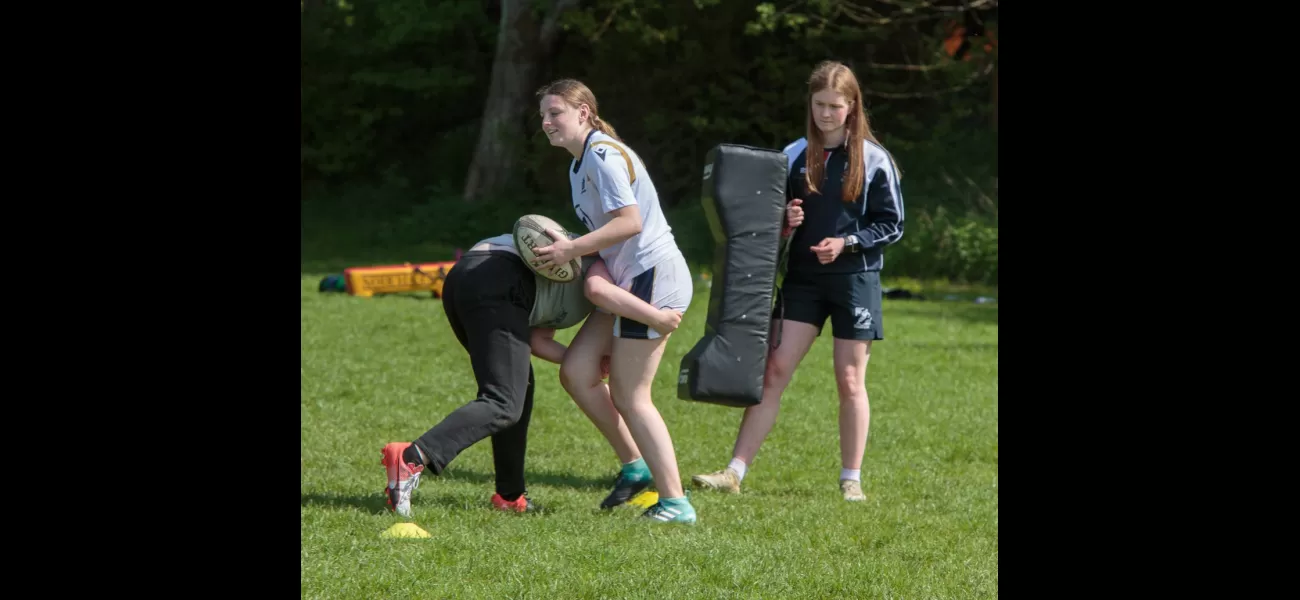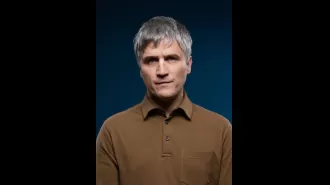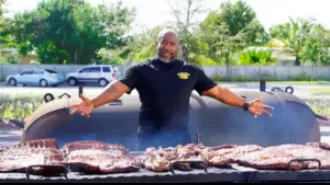The Strathmore Community Rugby Trust believes rugby has the ability to positively impact lives.
The Strathmore Community Rugby Trust uses rugby to teach life skills, build community, and promote respect and teamwork. It has the power to change lives.
August 6th 2024.

Team sports offer more benefits than just keeping us physically active. They can also teach us important life skills, such as teamwork and respect for others. In addition, they create a sense of community and belonging. This is something that the Strathmore Community Rugby Trust has recognized since its establishment in June 2017. The trust has witnessed the potential of rugby to promote adaptability, inclusivity, and the fostering of a healthy and unified community in the Angus and surrounding local authority areas.
Currently, the charitable organization runs ten different projects, impacting between 200 and 300 participants. These projects cater to various societal groups, including teens at risk of becoming anti-social, children with autism, and older people at risk of isolation. The best part? All of their projects, except one, are completely free of charge for participants. This is to ensure that there are no financial barriers preventing anyone from taking part. However, this also means that the trust relies heavily on the support of the community through local sponsors and donations to keep their projects running.
The trust's efforts have not gone unnoticed. In 2020, they were awarded the Pioneering Project at the Scottish Charity Awards for their groundbreaking work in creating the first autism-friendly rugby sessions for primary school children in Scotland. Their work has also captured the interest of His Royal Highness Prince Edward, who became the Royal Patron in 2021 and has visited twice.
Rugby is more than just a game of chasing a ball around a field. According to Maggie Lawrie, the Community Trust Manager at SCRT, the sport's core values of respect, integrity, and inclusivity are what make it so adaptable and accessible. She believes that there is an opportunity for everyone on a rugby pitch, regardless of their shape, size, or background. Maggie also notes that the rugby world has been slow in realizing the sport's potential for wider social impact, which is precisely what the trust is igniting through their work.
There are endless possibilities when it comes to rugby. It can be adapted and changed in various ways, yet still maintain its core values. As Maggie puts it, "You still have the same rugby values throughout everything, and it forms a real community. I think that's the one thing we say with all our projects - people feel part of something."
One of the trust's most celebrated projects is walking rugby, which caters to older members of communities or people recovering from illness or injury. While other walking sports, such as football, can test participants' balance and coordination due to having to dribble the ball, walking rugby allows for two feet to remain firmly on the ground. Maggie explains that when "you take that contact element out of rugby, it's almost like tig."
However, the trust's most inspiring project is their autism-friendly rugby sessions for primary school children diagnosed or undergoing a diagnosis of autism and their siblings. The coaches, who undergo special training, design and adapt their sessions to the participants' sensory needs. As children with autism often crave sensory input, these sessions provide them with the opportunity to release their built-up energy and tension in a safe and welcoming environment. Moreover, these sessions also offer much-needed respite for parents and guardians and allow them to connect with other families going through similar circumstances. Many of the participants in these sessions go on to play in the Youth Unified rugby team and feel included as part of the Strathmore Rugby Club.
The trust's impact goes beyond their own projects. Since the development of their autism rugby training course, originally used for internal training, they have begun to impart the course externally. This has allowed them to help other organizations deliver autism-friendly sessions in other parts of the country. Maggie shares that the trust has been in existence for seven years, during which they have become increasingly aware of the lack of truly autism-friendly opportunities and the lack of knowledge on how to adapt sessions. As a result, they have developed a training course that they now offer to other organizations.
In conclusion, the Strathmore Community Rugby Trust is not just about rugby. It's about promoting inclusivity, fostering a sense of community, and teaching important life skills through the sport. Their dedication and hard work have not gone unnoticed, and their impact goes beyond their local community. They are paving the way for a more inclusive and understanding society, one rugby session at a time.
Humanized Text:
Team sports are more than just a way to stay physically active. They can also teach us valuable life skills like teamwork and respect for others. These sports can also bring people together and create a sense of community and belonging. This is exactly what the Strathmore Community Rugby Trust has been doing since June 2017. They have seen the potential of rugby to adapt to different situations, be inclusive, and foster a healthy and unified community in the Angus and surrounding local authority areas.
The Trust is a charitable organization that currently runs ten different projects. These projects have impacted between 200 and 300 participants, helping various societal groups such as at-risk teenagers, children with autism, and isolated older people. The best part? All of their projects, except one, are completely free for participants. This is to ensure that financial barriers do not stop anyone from taking part. However, this also means that the Trust relies heavily on the support of the community through local sponsors and donations to keep their projects running smoothly.
The Trust's hard work and dedication have not gone unnoticed. In 2020, they received the Pioneering Project award at the Scottish Charity Awards for their groundbreaking work in creating autism-friendly rugby sessions for primary school children in Scotland. Their efforts have also caught the attention of His Royal Highness Prince Edward, who became the Trust's Royal Patron in 2021. He has even visited them twice to see their work in action.
Rugby is much more than just a game of chasing a ball around a field. Its core values of respect, integrity, and inclusion are what make the sport so adaptable and accessible. As Maggie Lawrie, the Community Trust Manager at SCRT, puts it, "There's an opportunity for everyone on a rugby pitch, regardless of your shape, size, or background. You'll always receive a warm welcome." According to Maggie, the rugby world has been slower in realizing the potential for wider social impact, but the Trust is igniting this through their work.
One of the most unique projects of the Trust is walking rugby. Usually, this type of sport is for older community members or those recovering from injuries or illnesses. However, other walking sports like football can still be challenging for participants due to having to dribble the ball. In comparison, walking rugby allows for both feet to remain firmly on the ground. Maggie explains that "when you take the contact element out of rugby, it's almost like a game of tag."
But perhaps the Trust's most celebrated project is their autism-friendly rugby sessions for primary school children. These sessions are open to children who have been diagnosed with autism or are undergoing a diagnosis, as well as their siblings. The Trust's coaches undergo special training to design and adapt the sessions to meet the participants' sensory needs. As Maggie explains, children with autism often crave sensory input, and the rugby sessions provide an opportunity for them to get the deep pressure they need as sensory seekers. Not only do these sessions benefit the children, but they also give their parents or guardians a chance to take a break and meet other families going through similar experiences. Many of the children who participate in the primary school sessions go on to join the Youth Unified rugby team and feel like a part of the Strathmore Rugby Club.
The Trust has also developed an autism rugby training course, originally used for internal training. But now, they have begun to offer the course externally, helping other organizations deliver autism-friendly sessions in different parts of the country. As Maggie says, "In the seven years since the Trust was established, we have become increasingly aware of the lack of truly autism-friendly opportunities and the lack of knowledge and training on how to adapt sessions for individuals with autism. That's why we developed our own training course, which we are now able to offer to other organizations."
Currently, the charitable organization runs ten different projects, impacting between 200 and 300 participants. These projects cater to various societal groups, including teens at risk of becoming anti-social, children with autism, and older people at risk of isolation. The best part? All of their projects, except one, are completely free of charge for participants. This is to ensure that there are no financial barriers preventing anyone from taking part. However, this also means that the trust relies heavily on the support of the community through local sponsors and donations to keep their projects running.
The trust's efforts have not gone unnoticed. In 2020, they were awarded the Pioneering Project at the Scottish Charity Awards for their groundbreaking work in creating the first autism-friendly rugby sessions for primary school children in Scotland. Their work has also captured the interest of His Royal Highness Prince Edward, who became the Royal Patron in 2021 and has visited twice.
Rugby is more than just a game of chasing a ball around a field. According to Maggie Lawrie, the Community Trust Manager at SCRT, the sport's core values of respect, integrity, and inclusivity are what make it so adaptable and accessible. She believes that there is an opportunity for everyone on a rugby pitch, regardless of their shape, size, or background. Maggie also notes that the rugby world has been slow in realizing the sport's potential for wider social impact, which is precisely what the trust is igniting through their work.
There are endless possibilities when it comes to rugby. It can be adapted and changed in various ways, yet still maintain its core values. As Maggie puts it, "You still have the same rugby values throughout everything, and it forms a real community. I think that's the one thing we say with all our projects - people feel part of something."
One of the trust's most celebrated projects is walking rugby, which caters to older members of communities or people recovering from illness or injury. While other walking sports, such as football, can test participants' balance and coordination due to having to dribble the ball, walking rugby allows for two feet to remain firmly on the ground. Maggie explains that when "you take that contact element out of rugby, it's almost like tig."
However, the trust's most inspiring project is their autism-friendly rugby sessions for primary school children diagnosed or undergoing a diagnosis of autism and their siblings. The coaches, who undergo special training, design and adapt their sessions to the participants' sensory needs. As children with autism often crave sensory input, these sessions provide them with the opportunity to release their built-up energy and tension in a safe and welcoming environment. Moreover, these sessions also offer much-needed respite for parents and guardians and allow them to connect with other families going through similar circumstances. Many of the participants in these sessions go on to play in the Youth Unified rugby team and feel included as part of the Strathmore Rugby Club.
The trust's impact goes beyond their own projects. Since the development of their autism rugby training course, originally used for internal training, they have begun to impart the course externally. This has allowed them to help other organizations deliver autism-friendly sessions in other parts of the country. Maggie shares that the trust has been in existence for seven years, during which they have become increasingly aware of the lack of truly autism-friendly opportunities and the lack of knowledge on how to adapt sessions. As a result, they have developed a training course that they now offer to other organizations.
In conclusion, the Strathmore Community Rugby Trust is not just about rugby. It's about promoting inclusivity, fostering a sense of community, and teaching important life skills through the sport. Their dedication and hard work have not gone unnoticed, and their impact goes beyond their local community. They are paving the way for a more inclusive and understanding society, one rugby session at a time.
Humanized Text:
Team sports are more than just a way to stay physically active. They can also teach us valuable life skills like teamwork and respect for others. These sports can also bring people together and create a sense of community and belonging. This is exactly what the Strathmore Community Rugby Trust has been doing since June 2017. They have seen the potential of rugby to adapt to different situations, be inclusive, and foster a healthy and unified community in the Angus and surrounding local authority areas.
The Trust is a charitable organization that currently runs ten different projects. These projects have impacted between 200 and 300 participants, helping various societal groups such as at-risk teenagers, children with autism, and isolated older people. The best part? All of their projects, except one, are completely free for participants. This is to ensure that financial barriers do not stop anyone from taking part. However, this also means that the Trust relies heavily on the support of the community through local sponsors and donations to keep their projects running smoothly.
The Trust's hard work and dedication have not gone unnoticed. In 2020, they received the Pioneering Project award at the Scottish Charity Awards for their groundbreaking work in creating autism-friendly rugby sessions for primary school children in Scotland. Their efforts have also caught the attention of His Royal Highness Prince Edward, who became the Trust's Royal Patron in 2021. He has even visited them twice to see their work in action.
Rugby is much more than just a game of chasing a ball around a field. Its core values of respect, integrity, and inclusion are what make the sport so adaptable and accessible. As Maggie Lawrie, the Community Trust Manager at SCRT, puts it, "There's an opportunity for everyone on a rugby pitch, regardless of your shape, size, or background. You'll always receive a warm welcome." According to Maggie, the rugby world has been slower in realizing the potential for wider social impact, but the Trust is igniting this through their work.
One of the most unique projects of the Trust is walking rugby. Usually, this type of sport is for older community members or those recovering from injuries or illnesses. However, other walking sports like football can still be challenging for participants due to having to dribble the ball. In comparison, walking rugby allows for both feet to remain firmly on the ground. Maggie explains that "when you take the contact element out of rugby, it's almost like a game of tag."
But perhaps the Trust's most celebrated project is their autism-friendly rugby sessions for primary school children. These sessions are open to children who have been diagnosed with autism or are undergoing a diagnosis, as well as their siblings. The Trust's coaches undergo special training to design and adapt the sessions to meet the participants' sensory needs. As Maggie explains, children with autism often crave sensory input, and the rugby sessions provide an opportunity for them to get the deep pressure they need as sensory seekers. Not only do these sessions benefit the children, but they also give their parents or guardians a chance to take a break and meet other families going through similar experiences. Many of the children who participate in the primary school sessions go on to join the Youth Unified rugby team and feel like a part of the Strathmore Rugby Club.
The Trust has also developed an autism rugby training course, originally used for internal training. But now, they have begun to offer the course externally, helping other organizations deliver autism-friendly sessions in different parts of the country. As Maggie says, "In the seven years since the Trust was established, we have become increasingly aware of the lack of truly autism-friendly opportunities and the lack of knowledge and training on how to adapt sessions for individuals with autism. That's why we developed our own training course, which we are now able to offer to other organizations."
[This article has been trending online recently and has been generated with AI. Your feed is customized.]
[Generative AI is experimental.]
0
0
Submit Comment





